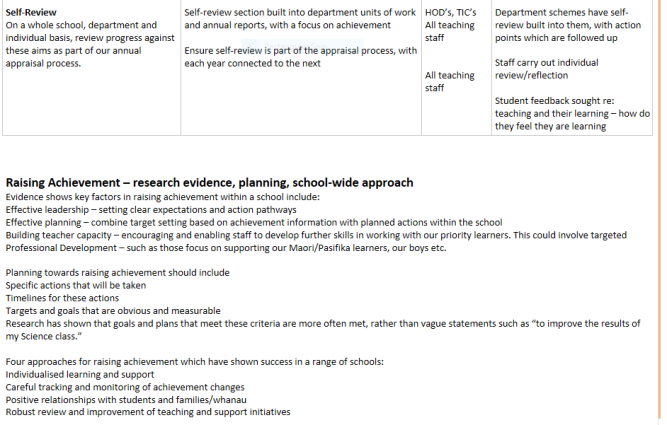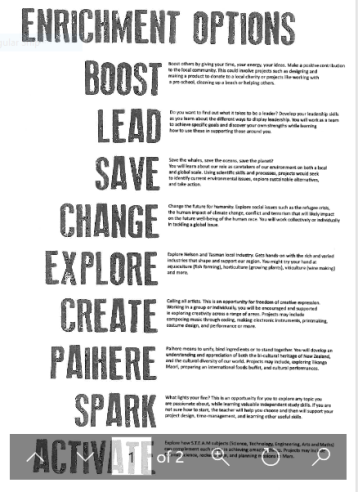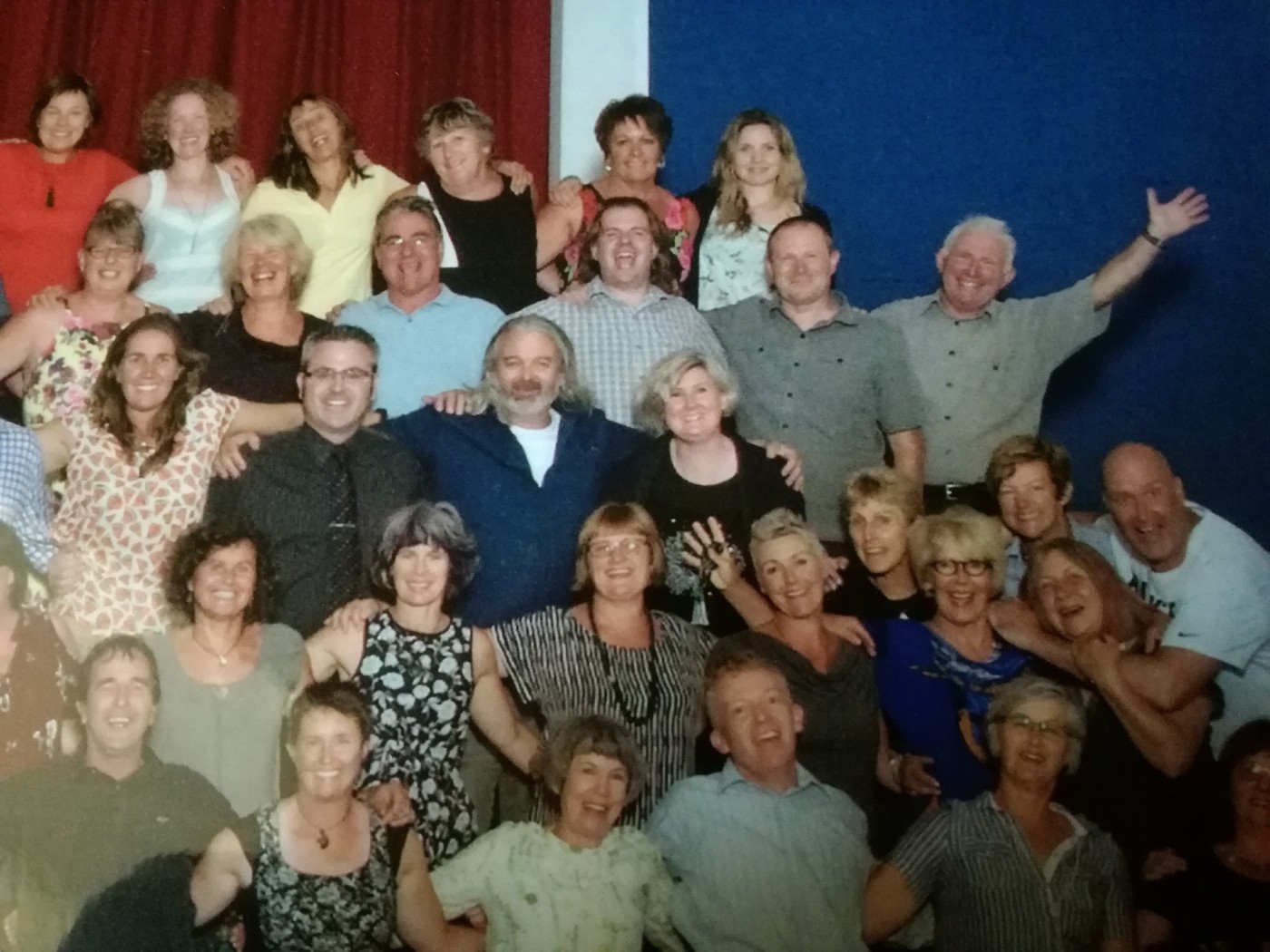Context
In 2015, the school community: students, teachers and parents were asked for their thoughts on the following questions: What is working well at Waimea College? What are the areas for improvement? What else would they like me to know as the new Principal?
From this grew a whole school review on the curriculum and the way it is timetabled based on research, observation of best practice, staff discussion and feedback sessions. The Achievement Team was set up to evolve these ideas further (fig. 1).
 Figure 1: overview of Achievement Team aims.
Figure 1: overview of Achievement Team aims.
My community of practice
I am part of the Enrichment Team, which is a sub-group of the Achievement Team. Our specific aims are to create learning programmes with:

According to the dictionary, ‘enrichment’ means: ‘action of improving or enhancing the quality or value of something’.
To me, enrichment then is something that will make learning a quality and valuable experience for our students. I am really excited about what lies ahead of us as we roll out this innovative development to our curriculum. Consequently, the Enrichment Team is my focus Community of Practice and comprises teachers from across the curriculum. My specific brief is to work alongside colleagues to develop a year 9 and 10 unit of study known as ‘Spark’, which will begin in 2018. We teach in different subject areas, which will be invaluable in developing such a broad ranged course.

Our Joint Enterprise
Based on the core values and key skills of the NZ National Curriculum, rather than subject driven assessment, this programme offers a horizontal approach in that it isn’t subject specific. It allows students to choose an area of interest, which they pursue under the guidance of a teacher, rather than being led. In that way ‘it is the experiences which teaching helps create that prompt learning, not primarily the acts of the teacher’. (Wenger, 2000 (Redmond, 2006, p.226))
Shared Domain
Depending upon student choice, it will be the teacher’s job to facilitate expert advice, which could come from within or beyond school. For instance, as we don’t offer Spanish in school, the student who wishes to do this will be offered the opportunity to take part in an online course. The student wishing to design wings may end up working with someone – student, teacher or expert beyond school – with design or engineering expertise. An issue for us will be the short time frame. It is possible to sign up for one of these enrichment courses for the year, but most will only last for nine weeks. Teachers and students are going to need to be highly motivated and organised in order for this to be achievable. ‘Mutual trust in the relationship’ (Wenger, 2000) is going to be essential if we are to pull this off.
My role
Working within my Community of Practice will allow me to share ideas and learn from others. None of us will lead, rather we will actively collaborate. We have already set up an online forum in the form of OneNote through which we can share resources, including links to research, and ideas. We have been given a day off timetable to gather our ideas together and form a nine-week programme. As B. Knox says in his video, ‘Cultivating Communities of Practice, 2009): ‘It is not about your needs, it’s about the participants’ and we need to be really clear about what they want to do and how we are going to facilitate this. We will see ourselves as facilitators, but we will also actively teach the skills of self-regulation, participation and collaboration. I will share the research I’ve done into Design Thinking and what I have learned from using rubrics as learning tools (21CLD Learning Activity Rubrics, 2010) to help design this aspect of the programme.
Not only will we, the teachers, be actively reflecting on our practice and sharing those reflections in a bid to make this course exciting, relevant and valuable (Knox, 2009) but we will also be encouraging the students to reflect through weekly discussions and diary entries. As these will not be assessment driven, I am hopeful that they will be open and frank (Finlay, 2009) offering us valuable student voice to add to our own reflections as we continue to evolve the course.
Tracy Simpson
Sources:
Finlay, L. (2009). Reflecting on reflective practice. PBPL. Retrieved from http://www.open.ac.uk/opencetl/files/opencetl/file…
Knox, B. (2009, December 4).Cultivating Communities of Practice: Making Them Grow.. Retrieved from https://www.youtube.com/watch?v=lhMPRZnRFkk
Wenger, E.(2000). Communities of practice and social learning systems. Organization,7(2), 225-246.
21CLD Learning Activity Rubrics. (2010). Microsoft partners in Learning 21st Century



Hi Tracey, This sounds like an exciting journey and innovative approach to growing collaboration throughout the staff team. Having managed the transformation of my RTLB team I am interested to hear how frequently your group got together to grow ideas and a shred culture. Our cluster is geographically challenged and we have to structure time to get our team together to grow an across cluster community of practice. This typically takes place on 2 team days per term as well as voluntary mixed office working groups which get together on average twice a term.
Good luck with the journey.
Ian
LikeLike
Hi Ian,
Thanks for your comments. Sorry it’s taken me a while to reply! It is much easier for us to collaborate because we are all in one place. This is a big secondary school, with 1600 students. That said, we are also incredibly busy. At the moment, we’ve got together formally once a term, so you have managed more time than we have – well done!. As we move towards Term 4 and our seniors leaving, we will have more time and we have been given a day off timetable to work together on fleshing out the starting programme. There is also a generic scheme of work template for us to use. The core values have already been established in that this is cross subject and the ‘assessment criteria’ should be based upon the key competencies. It is experimental, and will take us a couple of years to flesh out. Just like Design thinking, there will be a lot of iteration and prototyping!
LikeLike
Hi Tracey,
I enjoyed reading your blog post. This is an exciting development in the Waimea College learning programme. These enrichment programmes can be highly motivating for students. Enquiry based learning is highly engaging for students. This has been used in Primary schools for a while now and it is great to see a secondary school attempt to engage students this way. As you mentioned it will be a lot of work for teachers. You mentioned that you will be collaborating with other teachers, this shared workload should make it more manageable. Lastly, I like how you are using the Design Thinking 21 CLD Learning Activity Rubric with your colleagues. Using the resources and knowledge that we have acquired during the Mindlab course in our schools must feel rewarding. Thanks for sharing,
Stewart McKean
LikeLike